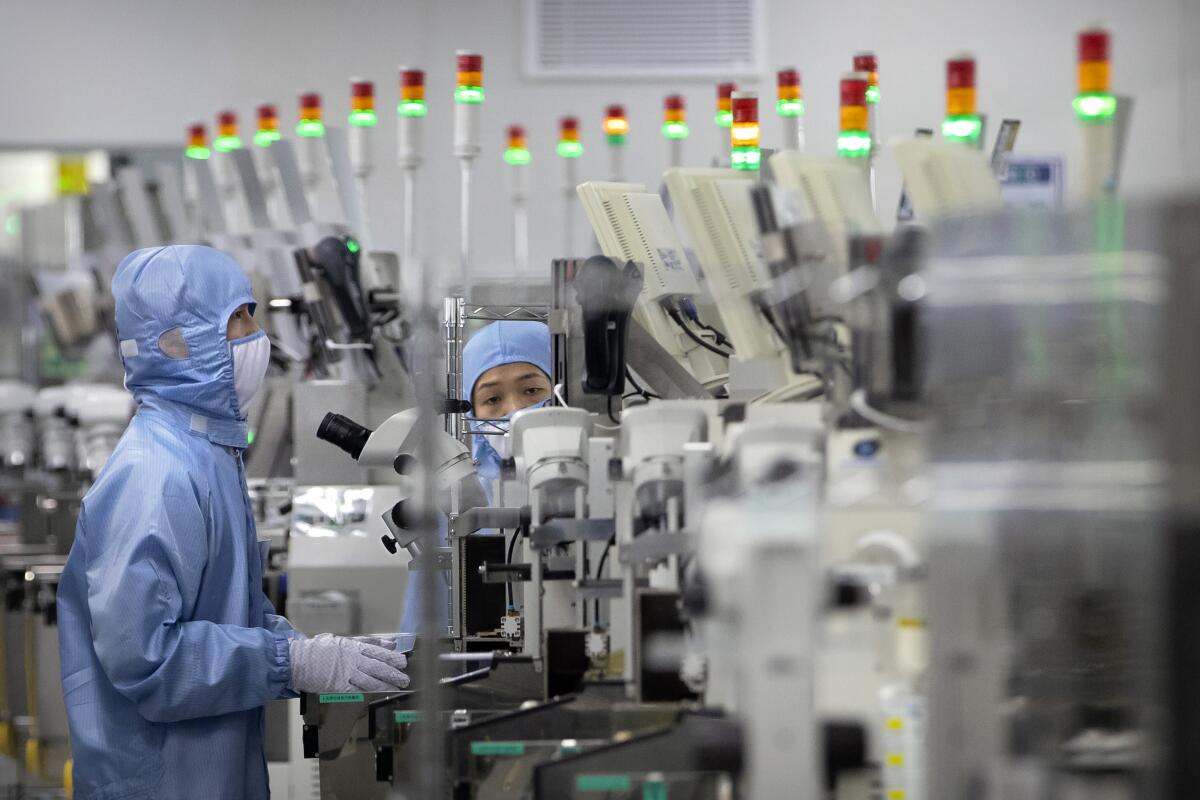Should the U.S. subsidize chip making? San Diego business leaders sound off

Our San Diego Econometer considers the roughly $76 billion in government subsidies approved for American semiconductor production
U.S. lawmakers approved about $76 billion in government subsidies this summer for American semiconductor production.
The investment is meant to limit the U.S. reliance on Asian nations for chips and more funding could be coming from the Biden administration.
Critics that study the industry question if U.S. money will make much of a difference. Concerns are new chip factories will take years to build and might not be able to offer the industry’s most advanced manufacturing technology when they begin operations. There is also a significant skills shortage.
The U.S. spending sounds like a lot, but it might not move the needle. A Boston Consulting analysis expected it would take $900 billion to $1.23 trillion in spending to create self-sufficient semiconductor supply chains worldwide. For just the U.S., it’s $350 billion to $420 billion.
White House officials have argued money spent on chip production improves national security, but experts say the U.S. is unlikely to shed dependence on Taiwan despite the significant investment. Reuters recently reported China is considering a $144 billion support package for its chip industry.
Q: Should the U.S. subsidize chip making?
David Ely, San Diego State University
YES: Robust chip manufacturing activity in the U.S. has spillover effects that benefit other sectors. Having a dependable domestic source of chips will foster investment and innovation throughout the economy. National security interests are served by a strong domestic chip manufacturing sector. Government subsidies can be conditioned on companies making significant investments themselves. U.S. subsidies can also level the playing field to allow U.S. firms to compete with foreign rivals receiving government support.
Ray Major, SANDAG
YES: If COVID taught us anything, it is that an overreliance on foreign manufacturing and a stable supply chain is potentially catastrophic to a nation’s economy. From a strategic perspective, the federal government should target key industries like semiconductor and pharmaceutical manufacturing to ensure that a sufficient percentage of their production is done in the United States. Further efforts should be made to diversify production away from Asia and to encourage production of key components in Mexico and other more friendly countries.
Caroline Freund, UC San Diego School of Global Policy and Strategy
NO: The U.S. has never done industrial policy well. Offering too little (chip making is very costly) too late (cycle is shifting from excess demand to excess supply) is not strategic. U.S. leads technologically because we source talent from the world, the best ideas find financing, and the overall investment climate is good. To maintain our lead, let’s steer scarce public funds to education, research and development without trying to pick winners.
Haney Hong, San Diego County Taxpayers Assoc.
YES: Normally I wouldn’t want taxpayer dollars going into private enterprise and creating market distortions, but our competitors like China are pumping money themselves into this. Some say that silicon is the new oil. When semiconductors and computer chips are such a ubiquitous part of our lives, including in our national defense, we have a public interest in sustaining some basic industrial base that could help us when we have no one to count on but ourselves.
Kelly Cunningham, San Diego Institute for Economic Research
NO: The federal government does not need to subsidize multi-billion corporations earning massive profits. The U.S. could lessen trade barriers and domestic costs imposed on manufacturing production, but little justification for incentivizing production of aging chip-making technologies. Intel indicated the worst of the chip shortage was already easing in 2022 and will fade in 2023. The government has little foresight on emerging technologies or anticipating upcoming market demand while bearing little responsibility for making such decisions.
Lynn Reaser, economist
YES: The U.S. share of global production has fallen from 37 percent in 1990 to 12 percent today. The Taiwanese have steadily been developing more and more effective chips over many years so they control 90 percent of the high-technology chip space today. The government’s $76 billion in subsidies may help, but no one should expect that the Taiwanese will lose their dominance any time soon.
Phil Blair, Manpower
YES: It is a matter of self-defense. Chips are an essential component of almost every product, both personal and military. But especially in high-tech military equipment. We need to be as self-sufficient as possible by producing the most innovative chips within the continental U.S. The fact that other countries are upping their subsidies only makes it more urgent.
Gary London, London Moeder Advisors
YES: I am in no position to know whether government investment in chip manufacturing would make a difference to our competitive position in that industry, or in national security. But if chip manufacturing is to diversify, why not target central American nations? The border crisis has arisen out of an absence of economic opportunity for mostly low-skilled persons. Surely they could be taught to make chips. If the government can support that, I am for it.
Alan Gin, University of San Diego
YES: Semiconductors will be an important industry for the foreseeable future, both for economic reasons and national security ones. The importance of technology makes the chips vital in everything from high-tech devices to cars to weapons. It is vital that the U.S. has a robust semiconductor industry, and more subsidies may be needed. Those subsidies are needed as the market cannot deal with the externalities related to national security concerns.
Bob Rauch, R.A. Rauch & Associates
NO: While the most advanced chips are imported from Asia, Intel, TSMC and Samsung are planning future investments in production of advanced/legacy chips in the U.S., with or without subsidies. These companies don’t need taxpayer or government encouragement. Furthermore, subsidies won’t alleviate the current chip shortage. The economic and national security justifications for throwing taxpayer billions at domestic chip makers are weak; now we must question any expense as we have thrown trillions at this market.
Kirti Gupta, Qualcomm
Not participating this week.
James Hamilton, UC San Diego
NO: The chip shortage resulted from a boom-bust cycle due to uncertainty about how long current conditions will last and the lead time necessary to be able to meet demand. Subsidies depend on where the political winds are blowing at the moment, which only adds to the uncertainty. If national security is the concern, I prefer using regulation or tariffs coordinated with other concerned nations as a way to deal with the problem.
Austin Neudecker, Weave Growth
YES: Semiconductors are vital components of both strategic and everyday items. Amid an unstable geopolitical landscape, 85 percent of leading-edge chips are made in Taiwan. Although companies are slowly diversifying their sourcing and manufacturers are investing in domestic production, these are costly and time-consuming projects. We can bolster development and use the subsidy qualification requirements to align our security and economic interests with the private sector. The pace of progress in robotics, AI, etc. will only increase.
Chris Van Gorder, Scripps Health
YES: Given the importance of semiconductors in every technology from military, defense, medicine and even green technologies, we must become more self-reliant as a country. The economic incentives alone may not eliminate the United States’ reliance on chips manufactured in Taiwan and elsewhere, but doing nothing increases our country’s vulnerability to China’s growing aggressive posture toward Taiwan and their own investments in chip manufacturing capability.
Norm Miller, University of San Diego
YES: We learned our lessons about critical manufacturing supply chains during COVID. This is a small step toward less dependency on a single supplier, for a critical input into our manufacturing sector, and one that China could someday try and control. We have almost no manufacturing capacity compared to our insatiable demand. It will take years and far more money to kick-start establishing this critical sector of the economy, but it is a step in the right direction.
Jamie Moraga, Franklin Revere
YES: The U.S. should subsidize chip making if there’s a strategic plan with identified metrics and an expected ROI to demonstrate success. The CHIPS and Science Act passed by policymakers last year provides over $52 billion in federal funding for semiconductor R&D, manufacturing and workforce development. If this federal funding can successfully reduce U.S. dependency on foreign chips, ease supply chain issues, bring manufacturing businesses and jobs back to the U.S., and protect U.S. national security, then it’s worth it.
Have an idea for an EconoMeter question? Email me at phillip.molnar@sduniontribune.com. Follow me on Twitter: @PhillipMolnar
Get U-T Business in your inbox on Mondays
Get ready for your week with the week’s top business stories from San Diego and California, in your inbox Monday mornings.
You may occasionally receive promotional content from the San Diego Union-Tribune.












